Tenth Cambridge Conference on Language Endangerment
Language Endangerment and Revitalisation: The decade ahead
July 12th 2024
Venue: Alison Richard Building, 7 West Road, Cambridge CB3 9DT
Organisers: Mari Jones (French Section, Faculty of Modern & Medieval Languages & Linguistics / Peterhouse, University of Cambridge) - mcj11@cam.ac.uk, Oliver Mayeux (French Section, Faculty of Modern & Medieval Languages & Linguistics / Trinity College, University of Cambridge) - ofm23@cam.ac.uk
Programme and abstracts
The programme is available to download here.
A booklet containing abstracts for all of the papers to be given at the conference is available here.
After an enforced hiatus due to the Covid-19 pandemic, the Cambridge Conference on Language Endangerment returned for its tenth year in 2024! Download the programme and abstract booklet.
Call for Papers
The Cambridge Conference on Language Endangerment is now back for its tenth year! Themes it has explored within language endangerment include: language policy and planning, language documentation, the role of new technologies, orthography development, the role of schools, new speakers, revitalisation strategies and language change. On this tenth anniversary of the conference, we invite participants to consider these themes and the way in which they will develop over the coming decade. What challenges lie ahead for endangered language communities, activists and academics engaged in reversing language shift? What theoretical frameworks are proving most successful in terms of the analysis of the linguistic structure of endangered languages? How will changing attitudes amongst speakers affect the success of language revitalisation? How will policy-makers shape language legislation and respond to the concerns of endangered language speech communities? Has the potential of new technologies been effectively engaged to support the documentation, description and revitalisation of endangered languages or has the role of these technologies been overplayed? How has the pandemic affected our field and endangered language communities? What, if any, is the lasting impact of Covid-19?
Some authors have made their slides available below:
Stefanie Cajka (University of Vienna): Seizing the decade ahead: A proposal for quality criteria for language safeguarding and revitalisation methods.
Olga Olina, Bruno Behling, Bastian Ilgner (Humboldt University of Berlin): Assessing language endangerment in urban contexts: Berlin's heritage languages and their speakers.
Diego Sidraschi, Emanuela Li Destri (University of Udine): Sociolinguistic analysis of Sappada/Plodn multilingual repertoire.
Jelena Živojinović, Roberto Dapit, Francesco Costantini (University of Udine): Sociolinguistic dynamics of Slovene linguistic islands in Friuli, Italy: Endangerment and preservation efforts.
Weijing Zhou (Yangzhou University), Francis Nolan (University of Cambridge): Perception, use, and predicition of endangered local dialects in Jiangsu Province among college students.
Ninth Cambridge Conference on Language Endangerment
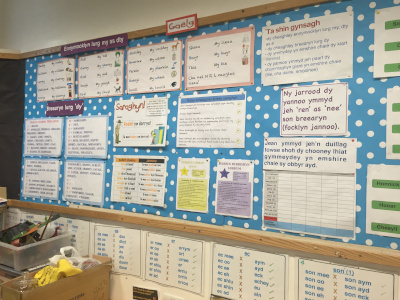
The Ninth Cambridge Conference on Language Endangerment, entitled 'Language Revitalisation: New speakers, new challenges, new linguistic forms', took place on July 2nd 2019 in the Alison Richard Building, Sidgwick Site, Cambridge. The call for papers, programme and abstract booklet can be found here.
Call for Papers
The main aim of language revitalisation is to set an endangered language back ‘on its feet’. Revitalisation strategies may be developed and implemented by linguists, the State, language activists and the speakers themselves. However, these strategies, which attempt to make the endangered language an attractive and useful resource for modern users, may result in the transformation of the endangered language rather than restoring it to its old self. This conference invites papers that reflect on these issues: What are the main challenges that face revitalising languages today and how do these differ from those faced by endangered languages? How realistic are the chances of returning an endangered language to its old domains (especially when, for pragmatic reasons, revitalisation campaigns tend to focus outside rather than inside the home)? What might the consequences of language revitalisation be in terms of the linguistic structure of the variety being revitalised? To what extent are ‘new-speakers’ in speech communities where an endangered language is being revitalised also agents of linguistic change? Can corpus planning ever completely undo the linguistic results of extensive interaction with the dominant language? Does language planning restore speech communities or does it transform them? Are ‘new-speakers’ ever at odds with ‘traditional’ speakers in terms of their geographical location, their social backgrounds, the nature of the variety they speak and even their reasons for speaking it? – and does this matter?
Eighth Cambridge Conference on Language Endangerment
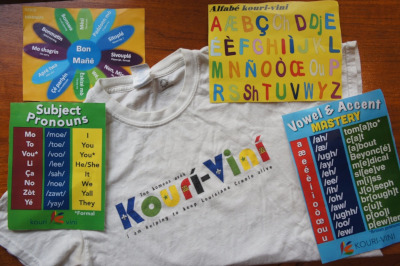
The Eighth Cambridge Conference on Language Endangerment, entitled 'Language Endangerment: Language Revitalisation and Reversing Language Shift', took place on July 4th 2018 in the Alison Richard Building, Sidgwick Site, Cambridge. The call for papers, programme and abstract booklet can be found here.
Summary
Language revitalisation strategies aim to increase the number of speakers of an endangered language. This process may be an integral part of reversing language shift (RLS). These strategies, which make the endangered language an attractive and useful resource for modern users may be developed and implemented by linguists, the state, language activists and the speakers themselves. This conference invites papers that reflect on these issues: To what extent are the attitudes and approval of the speech community key to the successful implementation of RLS strategies? Should revitalisation strategies involve both ‘top down’ and ‘bottom-up’ initiatives? If there are opposing views within the speech community as to how language revitalisation should proceed, how can the linguist help facilitate consensus-building? How context-specific are successful revitalisation strategies and to what extent is it possible to replicate these strategies across different situations of language obsolescence (including, for example, creoles, signed languages and whistled languages)? What might the consequences of language revitalisation be in terms of the linguistic structure of the variety being revitalised? To what extent are ‘new speakers’ in speech communities where an endangered language is being revitalised also agents of linguistic change?
Seventh Cambridge Conference on Language Endangerment
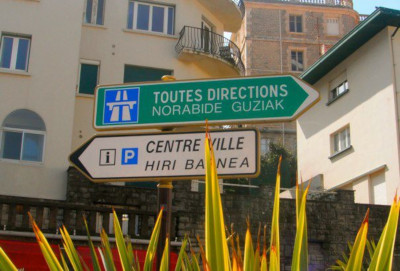
The Seventh Cambridge Conference on Language Endangerment, entitled 'Language Endangerment: Language Contact and Language Change', took place on July 4th 2017 in the Alison Richard Building, Sidgwick Site, Cambridge. The call for papers and more details are available here.
Summary
Languages become endangered when their speakers are in contact with other speech varieties which are often considered to carry greater social prestige. These interactions commonly lead to some change in how one or more of the languages are spoken. This could be in terms of the linguistic structure of the language itself or of the sociolinguistic situation and context in which the language is spoken. This conference invites papers that reflect on these issues: How are the functions of the endangered languages affected by contact? Are the linguistic changes observable in the grammar and vocabulary of endangered languages essentially the same as those that we find in languages that are not endangered? Are there any particular kinds of linguistic change that are more likely to occur in endangered languages? When endangered languages are documented, to what extent should contact-induced linguistic changes be included in this record? How is the make-up of the endangered language speech community affected by bi- or multi-lingualism? Are the attitudes of speakers towards commonly-found types of language change (such as code-switching and borrowing) different in speech communities where a language is endangered, as compared to those where the language is not endangered? Can any similarities be found between contact-induced change in endangered sign languages and that which occurs in endangered spoken languages?
Sixth Cambridge Conference on Language Endangerment
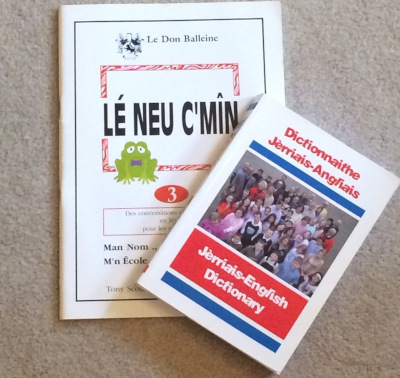
The Sixth Cambridge Conference on Language Endangerment, entitled 'Language Endangerment: Curriculum Design and Evaluation', took place on July 6th 2016 in the Alison Richard Building, Sidgwick Site, Cambridge. The call for papers and more details can be found here.
Summary
The school is often identified as an important context for the revitalization of endangered languages. Curriculum design and evaluation are therefore key factors in ensuring that such educational initiatives are successful. However, the precise sociocultural and political situation of endangered languages often preclude the simple replication of a curriculum developed for a language of wider communication for use within the endangered language classroom. This conference invites papers that reflect on these issues: How should conventions designed for dominant languages be modified in the endangered language context? To what extent should curriculum design and evaluation be situated within the social and cultural practices of the endangered language speech community? How should the short- and long-term goals of curriculum design and evaluation be assessed in the context of endangered languages? Who is best placed to design and to evaluate the curriculum for endangered languages – the linguist or the community? Are the goals of an endangered language curriculum simply to obtain fluency or should they be broader in scope? How should the approaches used in the design and evaluation of an endangered language curriculum take account of contextual factors? What problems arise for curriculum design and evaluation in multidialectal and/or multinational contexts? What pedagogical materials are necessary for the successful implementation and evaluation of an endangered language curriculum?
Fifth Cambridge Conference on Language Endangerment
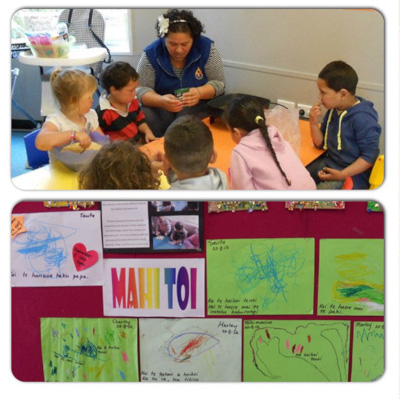
The Fifth Cambridge Conference on Language Endangerment was held at CRASSH on July 31st 2015. The theme of the conference was 'Language Endangerment and the Speaker. Alternative identities, new speech communities and changing linguistic norms'. More details are available at here.
Summary
Ensuring an increase in speaker numbers is a crucial part of the successful revitalisation of an endangered language. These efforts often target schoolchildren, in the hope of re-establishing communication between generations in the endangered language, and other age-groups, who identify with the cultural context of the endangered language but who may have been denied the opportunity of acquiring it via intergenerational transmission. The recruitment of 'new' speakers can therefore often have a marked effect on the existing endangered language speech community in terms of its social makeup, its identity and its language practices. This conference invites papers that reflect on these issues: To what extent should reversing language shift incorporate identity planning? How do the actors of revitalization persuade members of the 'dominant' speech community that their current identity would be enhanced by its repackaging to include the endangered language? How successful has formal education actually been in both increasing speaker numbers and, crucially, in transmitting the endangered language in a different way? Do 'new' speakers use the endangered languages in different ways from 'traditional' speakers and to what extent do these two groups in fact interact with each other? Do the linguistic norms and practices of 'new' speakers vary from those of the 'traditional' speakers? Does the speech of 'new' speakers reveal evidence of innovative linguistic features?
Fourth Cambridge Conference on Language Endangerment

The Fourth Cambridge Conference on Language Endangerment was held at CRASSH and Peterhouse on July 4th 2014. The theme of the conference was 'Endangered Languages and Orthographies'. Further details and list of plenary and confirmed speakers are available here.
Summary
Developing an orthography is often seen as a key component of language revitalisation. The ability to encode an endangered variety and to set it down as a permanent record can enhance its status and prestige. In speech communities that are fragmented dialectally or geographically, a common writing system may help create a sense of unified identity. In other cases, it may help keep a language alive by facilitating teaching and learning. Despite these clear advantages, when a language is endangered, creating an orthography can also bring challenges and this volume will debate these critical questions. Whose task should this be: that of the linguist or the speech community? Should an orthography be maximally distanciated from that of the language of wider communication for ideological reasons, or should its main principles coincide for reasons of learnability? Which local variety should be selected as the basis of a common script? Is a polynomic script preferable to a standardised orthography? Can developing an orthography actually create problems for existing native speakers?
Third Cambridge Conference on Language Endangerment
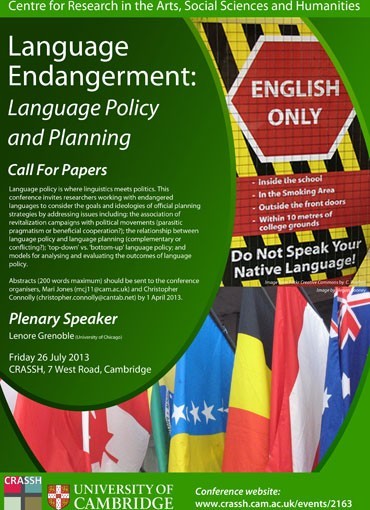
The Third Cambridge Conference on Language Endangerment was held at CRASSH and Peterhouse on July 26th 2013. The theme of the conference was 'Language Policy and Planning'. Further details and list of plenary and confirmed speakers are available here.
Summary
Language policy is where linguistics meets politics. Linguistic legislation serves as a medium through which power is negotiated between different speech communities within a given society. Where varieties are endangered, language policy often takes the form of specific ideologies that underlie language planning strategies. As such, its goals may be specific and practical in nature, such as orthographic reform, or more emblematic, such as measures for the promotion and protection of vulnerable languages. However, language policy issues are imbued with a powerful symbolism that is often linked to questions of identity, with the suppression or failure to recognize and support a given endangered variety representing a refusal to grant a ‘voice’ to the corresponding ethnocultural community. This conference will consider how and whether the interface between people, politics and language can affect the fortunes of the endangered linguistic varieties involved. Can policy really alter linguistic behaviour, or does it merely ratify changes already underway within the speech community? Do governments have a moral obligation to support endangered languages? Should linguists play a role in shaping language policy and, if so, what should that role be? When policy decisions are at odds with the will of the speech community, which will triumph?
Second Cambridge Conference on Language Endangerment
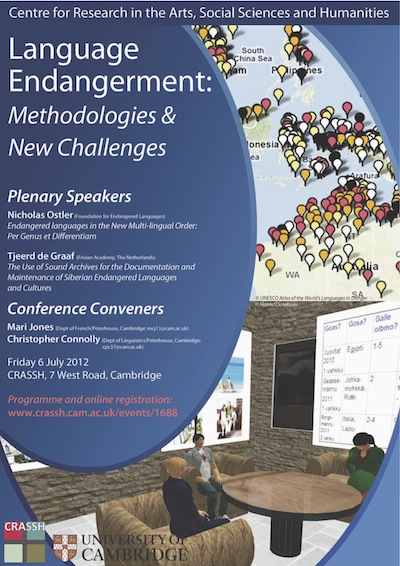
The Second Cambridge Conference on Language Endangerment was held at CRASSH and Peterhouse on July 6th 2012. The theme of the conference was 'Methodologies and New Challenges'. Keynote addresses were given by Nicholas Ostler (Foundation for Endangered Languages) and Tjeerd de Graaf (Frisian Academy).
Summary
At a time when UNESCO deems 43% of the world's 6,000 languages at risk of extinction, the imperative to record and analyse these linguistic varieties while they are still spoken has scarcely been greater. Yet researchers have ostensibly been slow to avail themselves of the opportunities offered by new techologies, from visual and aural archiving, to digitisation of textual resources and electronic mapping, techniques which could have the potential to play an integral role in reversing language shift. However, it is clear that with these new technologies come new challenges for the linguist. The Second Cambridge Language Endangerment Conference invites researchers to bring forward their ideas for tackling these issues: to share experiences from the field, to consider how these new resources might best be applied, as well as the problems that they can bring, to reassess more traditional techniques in light of new technologies and to work with a view towards achieving a practicable synthesis of old and new methodologies. At this critical time, our Conference seeks to ignite the debate as to what, if indeed anything, new technologies have to offer the fields of documentation, revitalization and maintenance, and how the research community might seek to enhance the functionality of these resources in order to advance their application beyond mere superficies.
First Cambridge Conference on Language Endangerment
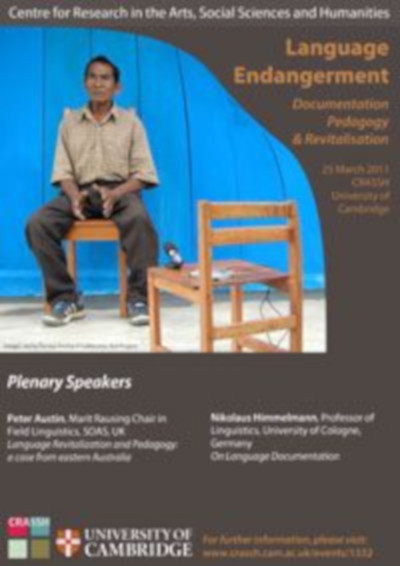
The First Cambridge Conference on Language Endangerment was held at CRASSH and Peterhouse on March 25th 2011. The theme of the conference was 'Documentation, Pedagogy, and Revitalization'. Keynote addresses were given by Peter Austin (Department of Linguistics at SOAS, University of London) and Nikolaus P. Himmelmann (Department of Linguistics, University of Cologne).
Summary
The 1st Cambridge Conference on Language Endangerment will focus on language documentation, pedagogy, and revitalization. It brought together academics, students, and members of indigenous communities from around the world to discuss current theories, methodologies, and practices of language documentation, pedagogy, revitalization. Most of the world's languages have diminishing numbers of speakers and are on the brink of falling silent. Currently around the globe, scholars are collaborating with members of indigenous communities to document and describe these endangered languages and cultures. Mindful that their work will be used by future speech communities to learn, teach, and revitalize their languages, scholars face new challenges in the way they gather materials and in the way they present their findings. This conference will discuss current efforts to record, collect, and archive endangered languages in writing, sound, and video that will support future language learners and speakers. Documentation is of critical and immediate importance, and is often considered one of the main tasks of the field linguist. Future revitalization efforts may succeed or fail on the basis of the quality and range of material gathered, and yet the process may be rapid and dependent on conscious decisions by linguists and language workers who may be analyzing the form of a language for the first time, and codifying it in dictionaries and grammars. Written documentation of course not only aids the process of standardization but also serves important needs and functions within a community in support of language maintenance such as providing the basis for pedagogical materials in schools and helping to create a community's sense of identity. However, indigenous communities and scholars of endangered languages are beginning to realise that the rapid and often artificial nature of this process can have negative effects - politically, linguistically, and culturally - which feed into issues relating to education and, ultimately, language revitalization. In addition to the opportunity of sharing experiences with a network of linguists, it is hoped that participants left the conference with a new understanding of the topic, innovative ideas for documentation and pedagogy within their own linguistic contexts, and a renewed vigour to implement what they have learnt in their own language situations.


